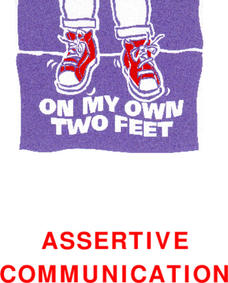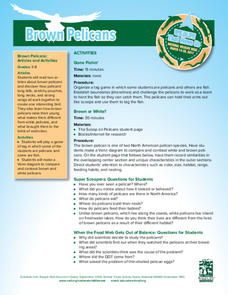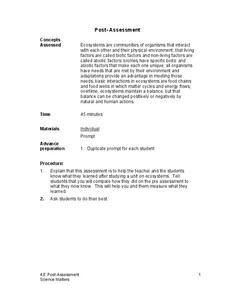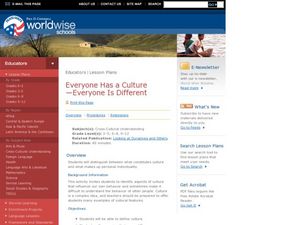Curated OER
What Makes The Good Life
What makes a good life? What makes life hard? Get your class thinking about the global picture with this extensive packet. They read quotes from around the world, analyze statistical data from every continent, then read and answer...
EngageNY
Mid-Unit Assessment: Text-Dependent and Short Answer Questions: Excerpts from “A Limited Supply”
There's no such thing as an unlimited resource. Scholars complete a mid-unit assessment by reading A Limited
Supply. They answer text-dependent questions and complete a graphic organizer about key terms in the text.
Health Smart Virginia
Mental Health PowerPoint and Notes
A 15-slide presentation summarizes key concepts from the Mental Health unit designed for freshmen. Viewers record the information on the provided worksheets. The notes prepare learners for a game of jeopardy.
Department of Education (Ireland)
Assertive Communication
Assertive communication is an acquired skill. Teaching young people to ask for what they need and to believe that they have a right to ask is at the core of a unit on assertive communication. Over the course of the unit, middle and high...
Western Justice Center
Underlying Needs
Conflicts arise when underlying needs are unmet. An engaging video introduces viewers to nine basic human needs. Then, through a series of videos, worksheets, and activities, class members learn that by focusing on interests and needs,...
National Wildlife Federation
Build a Bat House!
Bats usually get a bad rap. Scholars learn about the importance of bats and the threat their declining population has on the environment. They then build bat houses to attract and welcome bats into the area.
National Wildlife Federation
Brown Pelicans
Even animals that are part of the same species have differences. Learners read a passage about white and brown pelicans and compare their features. They recognize that although the birds look very similar, they also have their own unique...
National Wildlife Federation
Massive Migrations: Grades 5-8
Many Arctic species only spent a fraction of their lives in the Arctic region. Scholars research migrating Arctic species to learn more about their habits. They focus on their migration habits including distances, time, and challenges...
National Wildlife Federation
Habitat Web
It's all connected. Classes create a web to connect living things in a local ecosystem. They create cards with both living and nonliving things found in their areas while considering the characteristics of each. After they have a good...
National Wildlife Federation
Habitat Hunt
Put yourselves in their shoes—or, in this case, their paws. Learners assume the role of an animal and scan a habitat looking for features to fulfill their basic needs. Based on their findings, they decide if the habitat is a suitable...
Equality and Human Rights Commission
What Are Human Rights
What if, rather than being entitle to human rights, basic human rights had to be purchased? With a fixed income, what rights would you buy? How much would you be willing to pay for a particular right? to gain an understanding of the...
Science Matters
Post-Assessment
Twenty questions make up an assessment designed to test super scientists' knowledge of ecosystems. Scholars answer multiple-choice and short-answer questions about organisms, food chains, energy flow, and more.
Science Matters
Formative Assessment #2
Learners work collaboratively to predict what life would be like as an Arctic Hare. Teams go on a hunt where scholars role play an owl, white hares, and gray hares. Independently, pupils record their findings and reflect on their...
Science Matters
Lotusland
It's time for a field trip! Scholars take their new-found knowledge of adaptations and seed dispersal on a field trip to a local botanical garden. They gain an up-close look at how ecological interdependence works in a distinct...
Science Matters
Blubber Gloves: It’s All About Insulation
Instill the concept of adaptation with the help of Blubber Gloves—ziplock bags, shortening, and duct tape. Scholars discuss how animals and plants keep warm in polar regions, record their predictions, and try on their Blubber Gloves to...
Science Matters
Oh Heron
Two teams—the environmentalists and herons—play four rounds of the game, Oh Heron. Using hand symbols to represent food, shelter, and water, players locate their match to produce more herons while those unmatched decompose.
Science Matters
Basic Needs
Scholars take part in a grand conversation about the basic needs of living things. Working collaboratively, pupils brainstorm and identify similarities to come to the conclusion that the environment meets the needs of all living things.
Do2Learn
"I Need Help" Communication Board
Help scholars communicate their needs with a communications board equipped with 20 pictures including the needs of clothes, school supplies, and more!
Federal Reserve Bank
Monster Musical Chairs and Scarcity
Why can't we have everything we want? Youngsters are introduced to the concept of scarcity through a game of musical chairs and by discussing what it takes to satisfy our wants.
Michigan State University
May I Take Your Order?
If you're a pest, come and get a tasty meal here! Scholars work collaboratively to construct a mini restaurant out of a shoe box and create a menu that feeds a pest their favorite food.
Alabama Learning Exchange
Emotional Appeals in Persuasive Writing
Appealing to the emotions of a consumer or viewer is persuasion at its best. Introduce your writers to five different type of appeals: loaded language, basic needs, bandwagon, testimonial, and snob appeal. Effective examples are...
Curated OER
Everyone has a Culture-Everyone is Different
Students explore cultural features. In this multicultural acceptance activity, students define and discuss "culture," and distinguish the difference between individual characteristics and cultural characteristics. Students complete a...
Curated OER
Communicating at Work: Five Basic Human Needs
High schoolers explore five "Basic Human Needs" through lecture and group discussion. They consider how these needs, such as belonging, significance, etc. are essential in the workplace and discuss how to communicate their needs.
Curated OER
Do You Need What I Need?
Student identify the basic human needs. In this life science lesson, 3rd graders compare the needs of plants, animals and humans. They apply what they have learned by playing a survival team game.

























